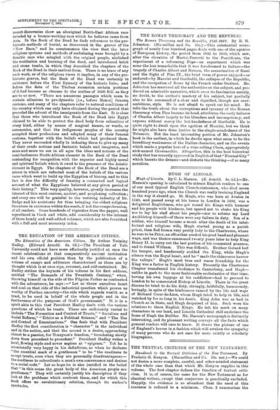THE EDUCATION OF THE AMERICAN CITIZEN.
The Education of the American Citizen. By Arthur Twining Hadley. (Edward Arnold. 6s. 6d.)—The President of Yale University could not have more effectually justified at once the recent celebrations at that comparatively ancient institution and his own official position than by the publication of a volume of essays and addresses characterised as these are by thought which is at once ripe, reverent, and self-restrained. Mr, Hadley strikes the keynote of his volume in his first address, entitled "The Demands of the Twentieth Century," when, throwing himself on the side of the Pilgrim Father as contrasted with the adventurer, he says :—" Let us throw ourselves heart and soul on that side of the industrial question which proves us worthy of Puritan ancestry—the side which regards wealth as a trust, to be used in behalf of the whole people and in the furtherance of the purposes of God's government." It is in a spirit akin to this that President Hadley deals with the various questions of which he treats. These are sufficiently varied to include "The. Formation and Control of Trusts," "Socialism and Social Reform," "Ethics as a Political Science," and "The Use and Control of Examinations." One feels that with President Hadley the first consideration is " character " in the individual and in the nation, and that the second is a desire, approaching almost to a passion, for Tennyson's freedom, "broadening slowly down from precedent to precedent." President Hadley writes a level, flowing style and never aspires at "epigram." Yet he is occasionally very happy in his definitions, as when he declares "the essential mark of a gentleman" to be "the readiness to accept trusts, even when they are personally disadvantageous— the readiness to subordinate a man's own convenience and desires to a social code." Let us hope he is also justified in the belief that "in this sense the great body of the American people are gentlemen." They will certainly justify his description if they look at the problems which confront them, and for which this book offers no revolutionary solution, through its author's spectacles.






























































 Previous page
Previous page